Stepping up for Glasgow's first Maggie's Culture Crawl
- Published
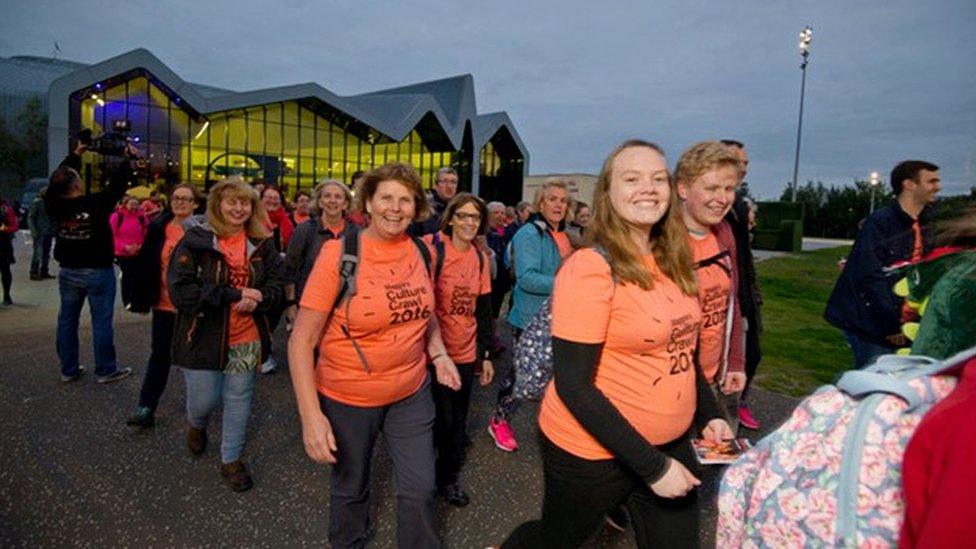
Hundreds of walkers have taken part in the Maggie's Culture Crawl in Glasgow - a 10-mile tour at night around some of the city's most interesting cultural spaces.
The cancer care charity has been staging fundraising cultural crawls in cities across the UK for a decade, but this was the first in Glasgow.
BBC Scotland's arts correspondent Pauline McLean joined in on the cultural adventure.

At 18:00 we gather outside the Riverside Museum in Glasgow. We're given water, oat biscuits and pizza slices as well as peach-coloured Maggie's T-shirts.
"I'm walking for" ...reads the speech bubble on the back. "Mum", someone ahead of me has added.
Several speakers give us words of encouragement. Lee Ann Mitchell has the moves as well as the words and we launch into a warm-up Zumba class. Policeman Alan wins a cheer from the crowd when he joins the team onstage.
The Proclaimers' Five Hundred Miles has us stomping around the forecourt crashing into each other. Hopefully our navigation skills will improve, or one or two of us will end up in the Clyde before the night is out.
A piper plays us off, as we stride purposefully down the riverbank.
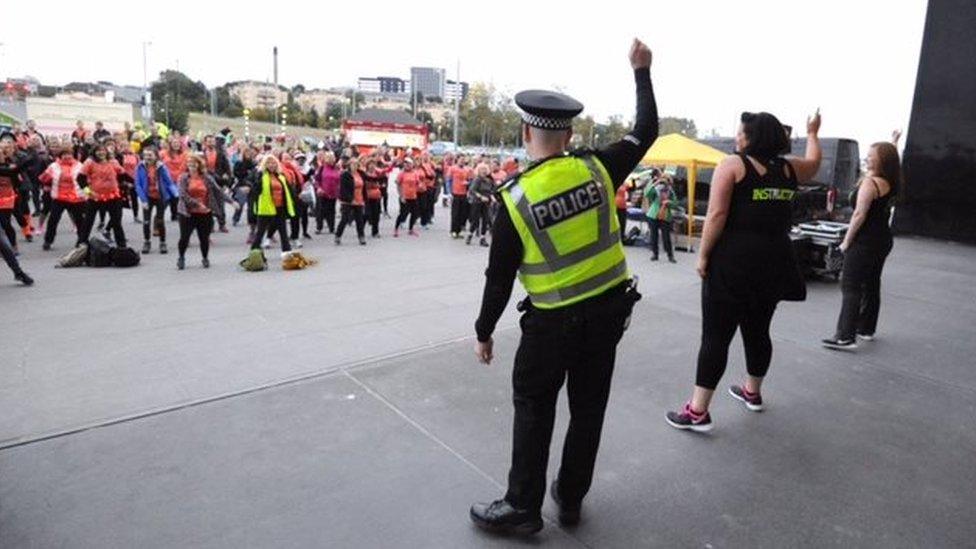
At 19:30 it's back to work for me as we arrive in the BBC Scotland reception, where a choir is singing and tea and cakes are being handed out.
The building is lit in green and purple in tribute to Maggie's centres around the world - including the one we'll end up at later.
People are doing the walk for many different reasons. Some have cancer themselves, or know people with cancer who've understood the benefits of well-designed centres for cancer care (just as Maggie Keswick Jencks thought when she was diagnosed. The first centre, named in her honour, opened a year after she died in 1996).
One lady is celebrating her 60th birthday. Another is part of a fundraising team, and there are plenty of folk just doing it for fun, to see a city at night, alive with all sorts of possibilities.
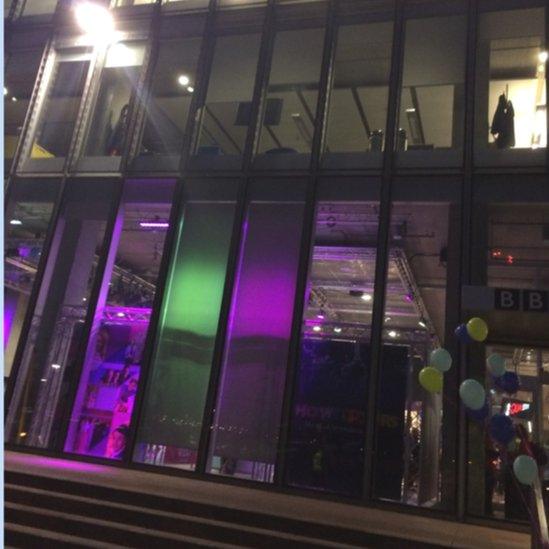
The BBC building was lit up in green and purple in tribute to Maggie's centres
Being out in the dark on the river bank is empowering. Several car loads of young folk shout encouragement, tooting their horns as they pass.
We stride along the Broomielaw, and cut up Buchanan street to the Gallery of Modern Art where members of the Connect Choir are singing their hearts out.
We stop to listen for while, but we're anxious to keep moving (not least because we're at the back of the pack) and the choir applaud us as we leave.
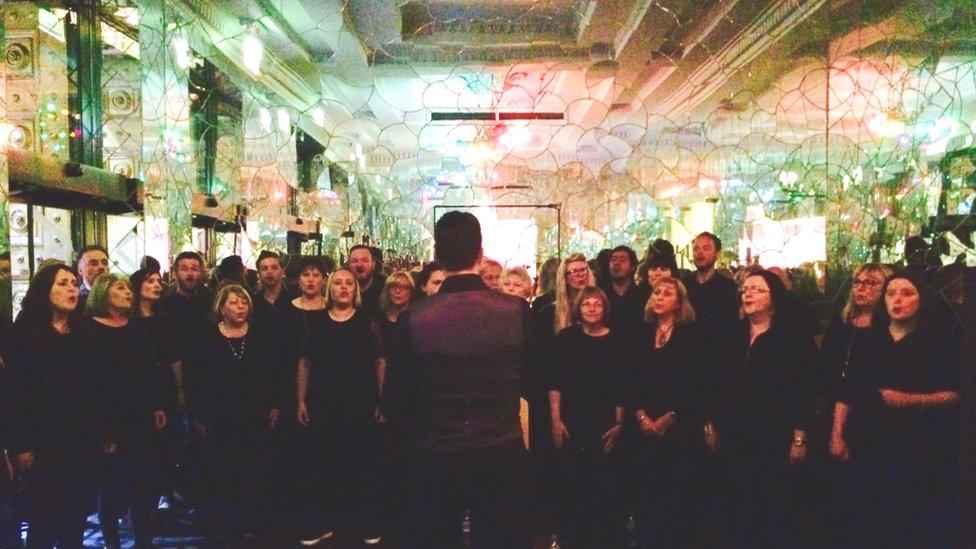
Members of the Connect Choir sang their hearts out at the Gallery of Modern Art
It's a strange experience. We haven't done anything but keep on walking. It's a nice feeling, though, and we leave like we're walking on air. If only that feeling could last.
Shortly after 21:00 we are walking through the Merchant City. Several people try to entice us into clubs or restaurants. A man asks if we're on a hen party. I suppose it's the matching T-shirts.
We arrive at Tennent's brewery in the East End. I've been before, but never out of hours.
It's not just the offer of lager and crisps which feels illicit, it's being escorted past the vintage "lager lovely" can collection, upstairs to their vintage bar-room when no-one else is in the building. No-one else but Scandiwegians Scandi - who're giving it laldy with their brand of traditional music.
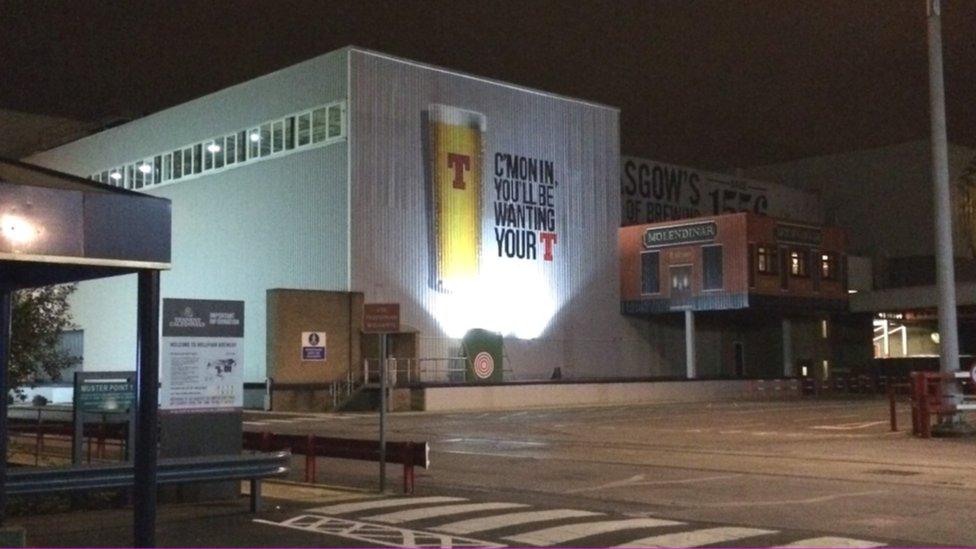
Tennent's brewery in the East End was on the itinerary
Getting going again is a challenge and we're beginning to feel a little weary. Or maybe that's the beer.
It's a long way across the city centre to Kelvingrove Park, but the newly restored bandstand is a sight for sore eyes - and its stone benches, a seat for sore legs.
We stock up on home-baked goodies and settle down for some music, some close-up magic, and some nostalgia in the park. It's warm enough to stay put under the stars but we get moving again.
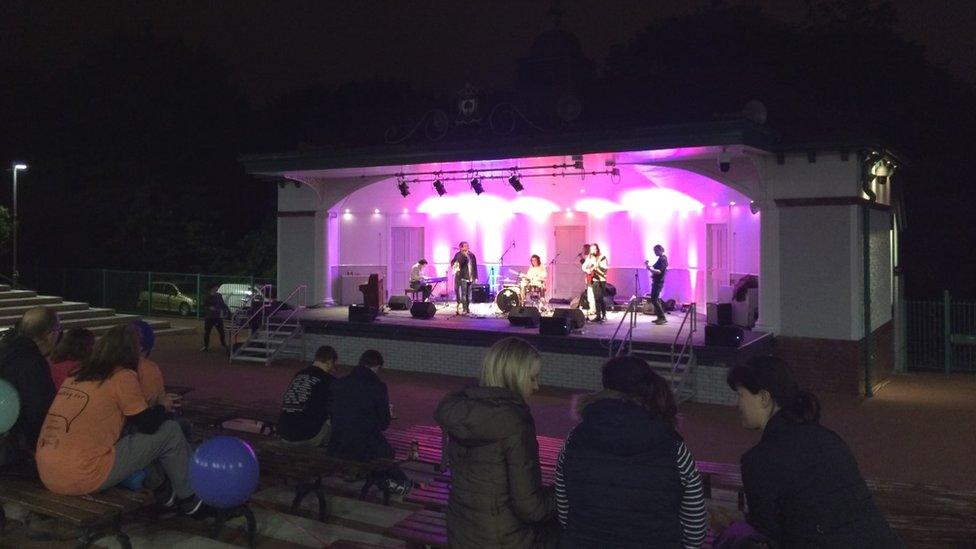
The newly restored bandstand in Kelvingrove Park was "a sight for sore eyes"
There's an extra stop at Glasgow University where we're invited to stroll through the cloisters, and stand at the flagpole looking down on the city's glittering lights.
It's 30 years ago this month since I first arrived here as a wide-eyed student. It's a place I know well - but even I don't recognise this stunning location in its night-time glory.
It's close to 23:00 and it is downhill to the Botanic Gardens, past Friday night drinkers coming home from the pubs on Byres Road.
We stumble into the Kibble Palace and a gentle performance of the gamelan - a traditional instrument from Java. Or instruments - for the gamelan is made of many different instruments and requires a whole team of musicians.
There are traditional mats on the floor - but several of us worry if we sit on them we won't be able to stand up again.
I have an overwhelming urge to lie down and sleep beneath the stars and the glass roof with the gently pealing bells and drums. But no, there's one last mile to walk.
It's close to midnight as we walk along Great Western Road. The elegant terraces seem to go on forever and every step is another ache but there are Maggie's volunteers to urge us onwards and even the odd toot from a passing motorist.
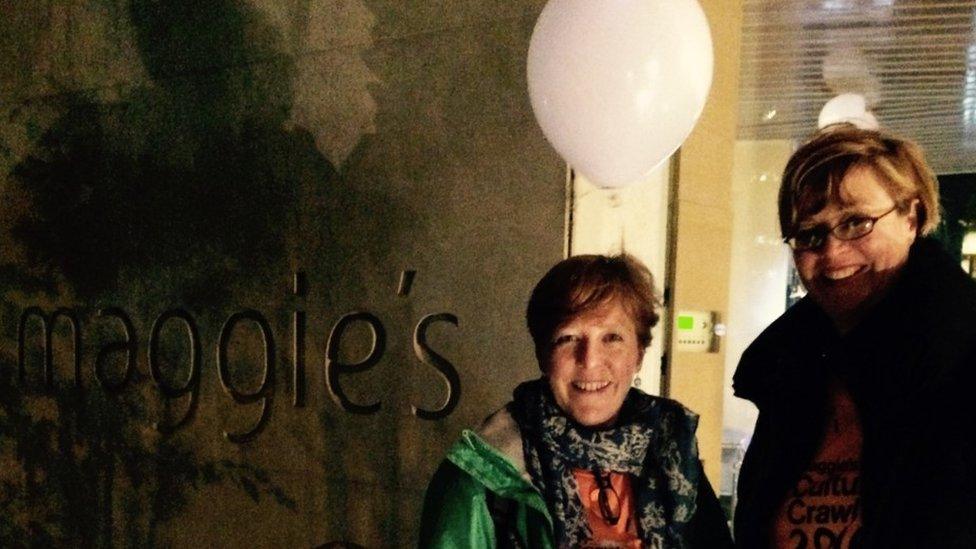
Pauline (right) and her friend Jan Patience arrive at their destination - Maggie's Gartnavel
It's with light hearts and heavy boots that we walk the final steps into Maggie's Gartnavel.
Having been presented with a medal, and a welcome glass of fizz, my friend Jan Patience and I find seats on a little terrace overlooking the gardens.
As we toast our tiredness, and feel a cool breeze in our hair, we're both glad this little corner - designed by Rem Koolhas - exists. That Maggie's centres across the globe exist - to offer a little hope to those a lot heavier in heart.
That's worth walking a few miles for - although hopefully, not till next year.